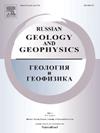Salair–Gornaya Shoria交界处(西北-中亚造山带):大地电磁数据的深层结构和构造
IF 1
4区 地球科学
Q3 GEOSCIENCES, MULTIDISCIPLINARY
引用次数: 0
摘要
—萨拉尔褶皱逆冲造山带(Salair造山带,Salair)位于中亚造山带内阿尔泰—萨延褶皱区西北部。Salair造山带是一个覆盖在叠瓦状逆冲系统上的库兹涅茨克盆地的异域构造。Salair逆冲系统的南翼在构造上与Gornaya Shoria地体并置,其地质背景与Salair有明显不同。Salair地体和Gornaya Shoria地体被Nenya-Chumysh盆地(一个中生代深槽)隔开。Salair造山带由寒武纪—早奥陶世岛弧火山岩和沉积岩、南翼安格鲁夫杂岩中广泛分布的石榴石角闪岩和片麻岩以及Alambai蛇绿岩缝合线中与俯冲有关的Shalap混杂岩组成。利用大地电磁测深技术对南部萨莱尔造山带及其与Gornaya Shoria的交界处进行了下地壳成像,是研究造山带深部构造和构造历史的有效工具。MT测量是在一条120公里长的剖面上的25个站点进行的。MT数据显示,Salair和Gornaya Shoria地块之间的低电阻率带(导体)宽达70公里,深度为20公里。低阻带结构复杂,内外边界几乎垂直倾斜。导体位于几个主要的地质构造下:沙拉普杂岩、涅尼亚-楚米什盆地和北东走向的阿尔泰-萨拉伊右旋走滑断层。阿尔泰-萨拉断裂带连接了萨莱尔叠瓦状逆冲构造体系,萨莱尔逆冲构造沿该断裂带相对于戈尔尼阿尔泰和戈尔纳亚绍里亚进行了位移。Salair-Gornaya Shoria交界处的Nenya-Chumysh盆地是一个深槽,其横向剖面不对称,西侧陡峭,东侧倾斜较浅。盆地东南侧为古生代基底上的大面积薄沉积层,向西北方向缓慢倾斜。Nenya-Chumysh海槽的深部构造与其构造模式一致,暗示早白垩世盆地叠加在早侏罗世拉分盆地之上。早中生代主要断层的运动是一种区域尺度的现象,在西西伯利亚南部的许多地区都有发现。本文章由计算机程序翻译,如有差异,请以英文原文为准。
Salair–Gornaya Shoria Junction (Northwestern Central Asian Orogenic Belt): Deep Structure and Tectonics from Magnetotelluric Data
—The Salair fold-thrust orogenic belt (Salair orogen, Salair) is located in the northwestern Altai–Sayan fold area within the Central Asian Orogenic Belt. The Salair orogen is an allochthon overriding the Kuznetsk Basin on a system of imbricate thrusts. The southern flank of the Salair thrust system is tectonically juxtaposed against the Gornaya Shoria terrane which differs markedly from Salair in its geological setting. The Salair and Gornaya Shoria terranes are separated by the Nenya-Chumysh Basin, a deep Mesozoic trough. The Salair orogen is composed of Cambrian–Early Ordovician island arc volcanic and sedimentary rocks, widespread garnet amphibolites and gneisses of the Angurep complex in its southern flank, and the Shalap subduction-related melange in the Alambai ophiolite suture. The southern Salair orogen and its junction with Gornaya Shoria have been imaged down to the lower crust by magnetotelluric (MT) soundings, which is an efficient tool for investigating the deep structure and tectonic history of orogenic areas. The MT surveys were performed at 25 stations on a 120 km long profile. MT data revealed an up to 70 km wide low-resistivity zone (a conductor) traceable till a depth of 20 km between the Salair and Gornaya Shoria terranes. The low-resistivity zone has a complex structure with its outer and interior boundaries dipping almost vertically. The conductor lies under several major geological structures: the Shalap melange, the Nenya-Chumysh Basin, and the NE trending Altai–Salair right-lateral strike-slip fault. The Altai–Salair fault, along which the Salair allochthon was displaced relative to Gorny Altai and Gornaya Shoria, joins the Salair system of imbricate thrusts. The Nenya-Chumysh Basin at the Salair–Gornaya Shoria junction is a deep trough having an asymmetric transversal profile with a steep western side and a shallower-dipping stepped eastern side. The southeastern flank of the basin is a wide area of thin sediments over the Paleozoic basement dipping gently in the northwestern direction. The revealed deep structure of the Nenya-Chumysh trough is consistent with its tectonic model implying an Early Cretaceous basin superposed over an early Jurassic pull-apart basin. Early Mesozoic motions on major faults is a regional-scale phenomenon known from many areas of southern West Siberia.
求助全文
通过发布文献求助,成功后即可免费获取论文全文。
去求助
来源期刊

Russian Geology and Geophysics
地学-地球科学综合
CiteScore
2.00
自引率
18.20%
发文量
95
审稿时长
4-8 weeks
期刊介绍:
The journal publishes original reports of theoretical and methodological nature in the fields of geology, geophysics, and geochemistry, which contain data on composition and structure of the Earth''s crust and mantle, describes processes of formation and general regularities of commercial mineral occurrences, investigations on development and application of geological-geophysical methods for their revealing. As to works of regional nature, accelerated publication are available for original papers on a variety of problems of comparative geology taking into account specific character of Siberia, adjacent Asian countries and water areas. The journal will also publish reviews, critical articles, chronicle of the most important scientific events, and advertisements.
 求助内容:
求助内容: 应助结果提醒方式:
应助结果提醒方式:


